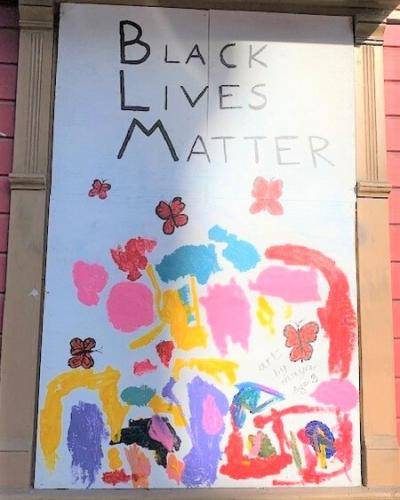When talking about what Dr. Martin Luther King, Jr. identifies as “the urgency of now,” it can be difficult for some to not slide into a narrative of catastrophizing. Deal or no deal, total collapse of society or why some people keep insisting on rocking the boat. The twenty-first century has been off to a rough start with the increase in global temperatures and fluctuations in weather patterns, the creeping influence of extremism, and the persistence of institutional racism. Being overwhelmed with the range of issues can make me want to take a couple of ibuprofen and hide under a blanket for a few hours. Hiding under a blanket can seem the best course of action for not increasing my carbon footprint or unknowingly committing a microaggression against a minoritized group, but if I remain under that blanket, what am I contributing to my community, and what privileges am I taking advantage of? Inaction affirms and perpetuates oppressive systems that deny another’s humanity. Yes, there are problems in the world today. It would be a discredit to the activists who have come before us to write off the fight for equity as impossible and failing to recognize that the systematic patterns of oppression in the USA trace back to white supremacy.
Dr. Martin Luther King, Jr. spoke candidly of two Americas, one “overflowing with the miracle of prosperity and the honey of opportunity” and the other where “people are poor by the millions… perishing on a lonely island of poverty, in the midst of a vast ocean of material prosperity” (King 1967). Typically, those who are not socially and economically privileged white people, i.e. people who are devalued through white supremacy, are shunted off to the “Other” America. Prolonged exposure to the other America can transform “the buoyancy of hope into the fatigue of despair” (King 1967), which swamped plenty of people in early 2020 as they experienced economic hurt and witnessed the murder of George Floyd. Issues of systemic racism manifest in police brutality, microaggressions, de facto segregation, and a lack of diversity in STEM fields, to name a very few. Yet, none of this is new, and
methods of resistance and guidance can be found in our past. Dr. King called for a universal income in 1967 and was warning that for every two steps of progress America makes for racial equality, she takes another step back. After people protested against the murder of Black Americans and police brutality, the anti-critical race theory (CRT) rhetoric was born, claiming that schools were trying to indoctrinate children into anti-white ideology via Maoist struggle sessions. These were and are untrue claims, but plenty of states have now passed legislation affirming this falsehood and even creating penalties for educators and school districts all over this country. African American philosopher and activist W.E.B. Du Bois commented that his college education did not alter how he was treated by people because of his race, having to ride in a segregated train car in the Jim Crow South. Unfortunately, we are separated from this wisdom by a generational gap, distancing ourselves from members in our communities who have experienced the same hurt. Audre Lorde points out that the generation gap is a tool of oppression, resulting in “historical amnesia” (Lorde 1980).
Having these historical blinders on keeps us from seeing that time is neutral. This is a key point in Dr. King’s “The Other America” speech. Inaction in the present does not promise racial equity tomorrow. Such a thought process is just playing by a set of rules that oppressive institutions have set, which is what W.E. B. Du Bois concluded in 1903. There is an urgency to act now, just as there was an urgency to act seventy years ago. Rewriting history to soften the tone of Dr. King is a power-grabbing move. That MLK Day is a federal holiday for most workers does not mean that we should stop scrutinizing the power-wielding institutions that demonized Dr. King and violated his right to privacy during his life, cracking open a cold one to celebrate the fictitious idea that America is in a post-racial society. Nor should we let him be remembered through the same institutions he was trying to dismantle and redesign. Dr. King was the person who had a dream and believed in nonviolence, but he was also the same person who recognized that “a riot is the language of the unheard” (King 1967).
MLK Day is often seen as a day of service, to engage in a meaningful way with the people and communities around us in efforts to reach through some of the racial, social, and economical dividers in our society and to forge community. Don’t just see the Other America and feel helpless. Do something to bring those two Americascloser together. Compassion and activism isn’t a one-and-done sort of activity; it is continual work and a way of life.

